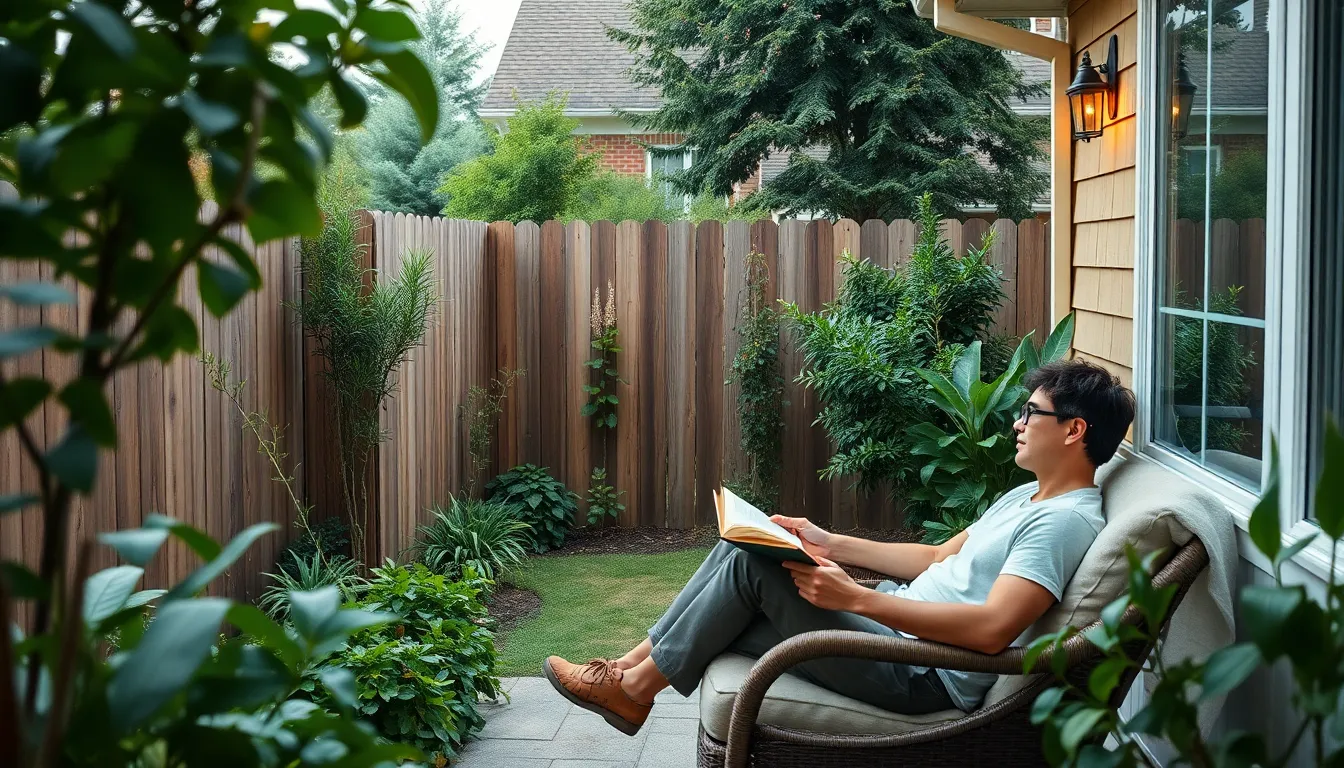In a world where everyone seems to be peeking over the fence or scrolling through your social media, maintaining privacy from neighbors can feel like an Olympic sport. Imagine sipping your morning coffee while your neighbor’s dog is judging your every move. It’s not just about avoiding awkward encounters; it’s about reclaiming your personal space and sanity.
Table of Contents
ToggleUnderstanding Privacy From Neighbors
Privacy from neighbors poses various challenges that many people face. Observing their routines can lead to discomfort when individuals feel they lack personal space. High fences, shrubs, and trees often help create a barrier but may require careful planning and maintenance. Effective landscaping not only enhances aesthetics but also bolsters privacy.
Certain design elements in outdoor spaces significantly contribute to seclusion. Using privacy screens or outdoor curtains can block direct sightlines, especially in patios or balconies. Enjoyment of outdoor areas increases with such enhancements.
Noise levels can also impact perceived privacy. Sound barriers, such as dense hedges or water features, reduce unwanted noise from nearby homes. Selecting the right materials for outdoor furniture can also minimize sound amplification.
Knowing local laws and regulations remains crucial. Homeowners’ associations often have specific rules regarding fences and landscaping. Researching these guidelines before making changes can prevent potential conflicts with neighbors.
Negotiating boundaries can foster good relationships. Open communication regarding privacy issues may lead to resolutions that satisfy both parties. Discussing concerns respectfully creates a more harmonious environment.
Some homeowners may choose specific building designs for added privacy. Landscaping layouts or building orientations can direct views away from neighboring properties. Thoughtful planning fosters a sense of ownership while maintaining personal space.
Staying aware of nearby activities also aids in understanding privacy dynamics. Observing patterns helps individuals anticipate potential intrusions. This awareness empowers homeowners to take proactive measures.
Importance Of Privacy From Neighbors

Maintaining privacy from neighbors significantly impacts mental health and overall comfort at home. A secure personal environment fosters a greater sense of tranquility.
Psychological Well-Being
Privacy enhances psychological well-being. Individuals often feel anxious when they sense others constantly watching. An unobserved space allows for relaxation and genuine self-expression. Enjoying simple moments, like gardening or reading, becomes more fulfilling without prying eyes. Those who establish privacy boundaries report lower stress levels and improved emotional health. A private environment supports creative thinking and personal exploration, providing a sanctuary from societal demands.
Sense Of Security
A strong sense of security originates from having privacy. Knowing that one is protected from unsolicited attention builds confidence at home. Inviting friends or family over requires a comfortable atmosphere, achievable with personal privacy. This security acts as a foundation for building trust among neighbors and friends alike. Without privacy, individuals may feel vulnerable, leading to heightened anxiety and distrust. Securing one’s space empowers residents to enjoy their homes without fear of intrusion. Enhanced privacy measures, such as proper fencing or landscaping, contribute significantly to perceived safety.
Common Privacy Concerns
Privacy concerns frequently arise in residential areas, highlighting the need for effective solutions to address these issues. Two major worries include overlooking windows and noise disturbance.
Overlooking Windows
Overlooking windows often compromise privacy for homeowners. They allow neighbors to see directly into living spaces, creating discomfort. Installing window treatments like blinds or shades can effectively obstruct the view. Frosted glass or privacy film serves as another option, maintaining natural light while ensuring seclusion. Landscaping with tall plants, trees, or trellises can add another level of visual barrier, fortifying privacy without sacrificing aesthetics. Strategic placement of furniture may also block sightlines from adjacent properties, enhancing the indoor experience.
Noise Disturbance
Noise disturbance frequently disrupts personal peace and tranquility. Sounds from neighbors’ activities can invade living spaces, causing stress and discomfort. Installing soundproof windows can significantly reduce exterior noises. Acoustic panels provide additional insulation for walls, creating quiet zones within homes. Using outdoor water features or white noise machines helps mask unwanted sounds. Building fences or barriers can contain noise and act as a shield from external disturbances, ensuring a more serene environment. Engaging in open discussions about noise levels with neighbors can lay the foundation for mutually respectful relationships, encouraging mindfulness in shared living situations.
Strategies To Enhance Privacy
Enhancing privacy from neighbors involves both physical and strategic measures. The following sections outline key approaches to achieving a more private outdoor experience.
Building Fences And Barriers
Fences serve as effective physical barriers that demarcate property lines. Wooden fences provide a sense of seclusion, while vinyl options offer durability and low maintenance. Height matters; higher fences often enhance privacy. Consider lattice-topped designs for added aesthetics without sacrificing seclusion. Barriers made from materials like stone or brick combine strength with visual appeal. Additionally, adding gates can create a welcoming entry while maintaining privacy. Local regulations often dictate fence height, so check these before installation.
Choosing Strategic Landscaping
Landscaping can significantly boost privacy. Dense shrubs and tall trees create natural screens that block sightlines. Plants such as arborvitae provide year-round coverage, while flowering hedges enhance beauty and seclusion. Incorporating staggered plantings promotes a layered look, increasing visual barriers. Features like trellises with climbing vines also contribute to privacy while adding charm. Ground coverings can minimize line-of-sight without obstructing sunlight. Thoughtful placement of natural elements turns outdoor spaces into personal sanctuaries.
Legal Aspects Of Privacy From Neighbors
Understanding legal aspects is crucial for maintaining privacy from neighbors. Compliance with local laws and regulations safeguards personal rights, making privacy preservation effective.
Local Ordinances And Regulations
Local ordinances and regulations play a vital role in privacy protection. Many municipalities enforce specific zoning laws, including height restrictions on fences and placement of landscaping. Researching these codes prior to making alterations ensures compliance and prevents potential disputes. Some areas might also require permits for significant structures, making it essential to check local guidelines before proceeding. Consultation with local government offices or websites often provides detailed information regarding ordinances that affect privacy measures.
Understanding Property Lines
Understanding property lines helps to define personal and neighbor boundaries. Property surveys offer precise measurements, clarifying ownership of land and structures. Misunderstandings about these lines can lead to conflicts, especially regarding fences and landscaping within shared spaces. Neighbors must communicate openly about boundaries to prevent encroachment disputes. Resources such as property deed descriptions and county assessor maps assist homeowners in confirming property lines accurately. Clear understanding of these lines fosters respectful neighbor relationships and enhances privacy solutions.
Maintaining privacy from neighbors is essential for creating a peaceful home environment. By implementing effective strategies such as proper fencing and thoughtful landscaping, individuals can reclaim their personal space and enhance their well-being. It’s crucial to stay informed about local regulations and engage in open communication with neighbors to foster understanding and respect. Prioritizing privacy not only leads to a more comfortable living situation but also contributes to improved mental health and emotional security. Embracing these measures allows residents to enjoy their homes without the constant worry of being observed or disturbed.





